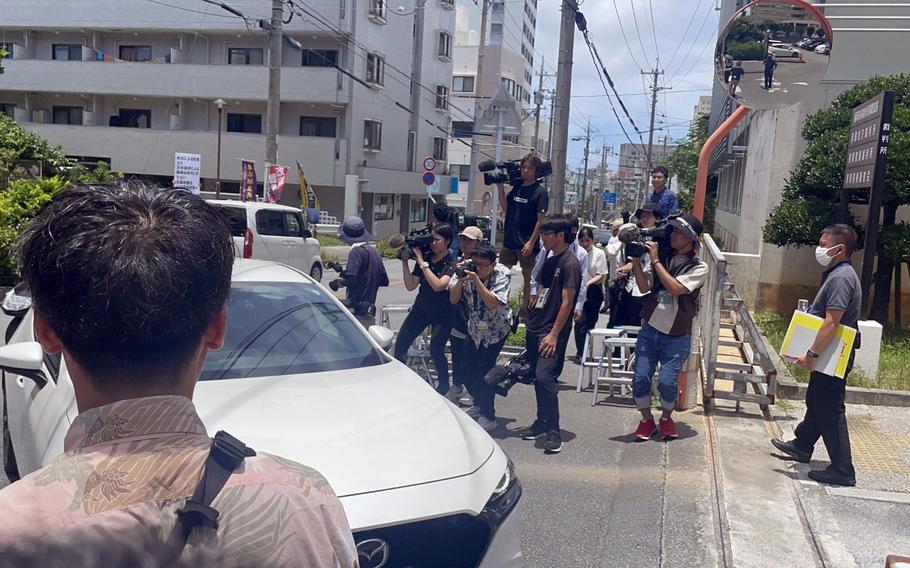Asia-Pacific
There’s no political will to change SOFA in wake of Okinawa indictments, experts say
Stars and Stripes August 19, 2024

Japanese media attempt to photograph Senior Airman Brennon R.E. Washington outside Naha District Court on Okinawa, July 12, 2024. (Keishi Koja/Stars and Stripes)
CAMP FOSTER, Okinawa — Public outrage over recent allegations of sexual offenses by U.S. service members is probably not enough to alter the legal relationship between the U.S. military and the Okinawa population, according to university researchers.
The political will for substantial changes to the status of forces agreement governing U.S. personnel in Japan is missing in Tokyo, but that may change with Prime Minister Fumio Kishida stepping down in September, two academics told Stars and Stripes.
In March, a U.S. service member was indicted in Naha District Court on charges of kidnapping and sexually assaulting a minor in December. Local prosecutors withheld that information from the public and prefectural government until June, when Senior Airman Brennon R.E. Washington was scheduled for a court appearance. He denied the charges during a July 12 court appearance.
News of Washington’s indictment was still fresh on June 17 when Japanese prosecutors indicted another service member in an unrelated case. Marine Lance Cpl. Jamel Clayton, 21, was charged with attempting to sexually assault a woman in Yomitan village on May 26. A court date has not been set.
Both cases and the ensuing tumult have received widespread attention, and troop misconduct made the agenda at the Cabinet-level Japan-U.S. Security Consultive Committee meeting on July 28 in Tokyo.
The Okinawa Prefectural Assembly approved a petition in mid-July calling for changes to SOFA, which the assembly said privileges U.S. personnel accused of crimes on the island.
‘Zero possibilities’
In Tokyo, the national government has little incentive to further amend the agreement, Akiko Yamamoto, associate professor of politics and international relations at the University of the Ryukyus, said at her office on July 22. SOFA lays out the rights, privileges and responsibilities by which all U.S. military personnel must abide.
“I don’t think so, zero possibilities,” she said. “The Japanese government doesn’t want to do so; they don’t want to react to these incidents.”
Robert Eldridge, who from 2009 and 2015 served as deputy assistant chief of staff of government and external affairs for the Marine Corps on Okinawa, agreed, to an extent.
Eldridge, a visiting a fellow at Tamkang University in Taiwan and a former associate professor of U.S.-Japan relations at Osaka University, said he does not see a “vigorous push by either side” to change SOFA. Any major rewrite of the agreement, which was last updated in 1960, would “invite congressional oversight,” he said during an Aug. 13 video call.
A change to the agreement could be more likely under a new prime minister, Eldridge wrote in an Aug. 15 follow-up email. He sees Taro Kono and Shigeru Ishiba, top candidates to lead the Liberal Democratic Party, as likely to push for revision “as both are populists.”
However, LDP Secretary-General Toshimitsu Motegi is a “no” on revisions. Economic Security Minister Sanae Takaichi might be open to revisions but not as a “first priority,” Eldridge said.
‘Touch points’
Okinawan media also has compared Washington’s case to a consequential case from 1995, when two Marines and a Navy corpsman were convicted of kidnapping and raping a 12-year-old Okinawan girl.
“I think you’ve got some pretty resonant similarities, maybe not exact similarities, but you’ve got some touch points, I think, among the Okinawan people on this case,” said Sheila Smith, the John E. Merow senior fellow for Asia-Pacific studies at the Council on Foreign Relations in Washington, D.C., in a July 19 video call.
The 1995 case incited mass protests and a handshake agreement by the U.S. government to transfer individuals suspected of crimes such as homicide and rape to the Japanese government for indictment.
Eldridge, author of the 2001 book “The Origins of the Bilateral Okinawa Problem,” said he sees no parallels to the 1995 case. The girl doesn’t appear to have been forcibly abducted, she wasn’t beaten, and the sexual connection hasn’t been completely determined yet, he said.
The public is interested in coverage of these events, but less so than the longstanding opposition to the U.S. military presence on the island, said Yamamoto, of the University of the Ryukyus.
Younger Okinawans already “don’t have a good image of U.S. service members these days,” she said. “Many of my students have experienced troubles with them.”
Okinawans are more concerned with “adequate legal redress” from crimes that are committed by U.S. personnel, said Smith at the Council on Foreign Relations.
Some perceive these offenses as being prosecuted “behind the secret doors of the U.S.-Japan alliance,” she said.
“Does the system work well enough? I don’t know,” she said. “In the court of public opinion, any crime is one crime too many, obviously, in Okinawa.”